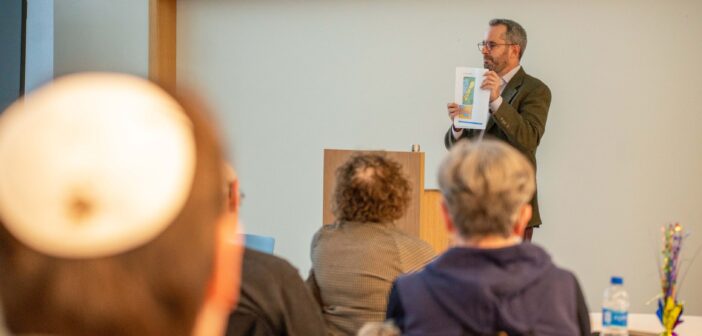Rabbi Dr. Jay Michaelson is an award-winning journalist who visited Lehigh on Feb. 29 to give a presentation of understanding the narratives about the Israel-Hamas conflict and how each side perceives the conflict.
“To understate it, there is a lot of friction and pretty intense rhetoric on both sides around this issue,” Michaelson said. “There could be a different presentation about convincing everyone why my take is correct, but I am less interested in that and more into, how can we have a somewhat more empathetic conversation?”
Michaelson emphasized he is not trying to take a stance on moral relativism and believes people can and should continue to have strong opinions, but they should do so in a way that is understanding of the other side.
“When I was really starting out, it was the peace process in the 1990s and it was a very optimistic time that now might be impossible to even conceive of,” he said.
Michaelson said possible paths toward resolution or reconciliation are currently harder to determine than ever — he said he wanted his whole presentation to showcase that fact.
“If you look at America, the pro-Israel and pro-Palestine sides have always been far apart, but the intensity of the dispute is much higher now because the war is intense and there are people dying,” Michaelson said. “There is a pessimism out there in terms of hope for the future, but if it’s going to happen, it’ll happen by people trying to see one another.”
Michaelson said college students tend to have lots of various judgments made about them, but he believes college is the time for students to explore who they are and what they believe in.
He said caring about these issues is normal, especially in the current political climate and stressed the importance of becoming as informed as possible on all issues before speaking on them.
Bishop Pikinini, ’24, said he has been attending a range of events covering the conflict to be able to speak on the issue from a more informed perspective.
Pikinini said speaking from emotion can drive people to activism, but it is important to be educated about an issue to avoid misrepresenting it.
“I see a lot of students shortcut the process into activism,” Pikinini said. “I think activism comes with the responsibility of educating yourself as well, so if you’re going to speak on an issue, it’s also your responsibility that you are not speaking from a place of just ignorance or just passion.”
Rachelle Huh, ’23, said she saw the event as a chance to gain an educational perspective.
“I know it is a very limited perspective, at least in my opinion so far, but it’s giving me a better idea on how students are reacting to it now, how the school is handling it, what are some things being said, and how the student body has been educated thus far about it,” Huh said.
Meghana Nimmagadda, ’27, said she chose to attend the event because she was curious about hearing a moderate perspective of the Israel-Hamas conflict.
“I think that everybody has their views, no matter how involved they are, so it is always good to go and listen,” Nimmagadda said.
Michaelson said simply responding to images on the news can be irresponsible, as people are not always making sure the stance they are taking is informed by facts.
He said political points should be grounded in empathy, facts and multiple narratives, and to be wary to not use rhetoric that makes the other out to be anything less than fully human.
“It is a very sensitive topic,” Pikinini said. “I think the speaker gave this topic sensitivity, without also taking away the directness of it. In some events when people become sensitive, they overlook facts, and when people become very factual sometimes, they become less sensitive. I think that the ability to do both; to speak from empathy, but to still speak from truth is a very important thing.”






Comment policy
Comments posted to The Brown and White website are reviewed by a moderator before being approved. Incendiary speech or harassing language, including comments targeted at individuals, may be deemed unacceptable and not published. Spam and other soliciting will also be declined.
The Brown and White also reserves the right to not publish entirely anonymous comments.